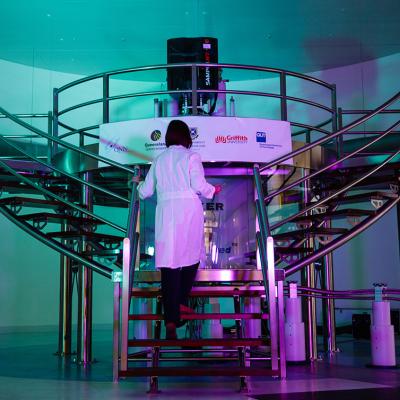UQ researchers are pushing the boundaries to discover the unknown in venom, investigating how this dangerous substance can lead to eco-friendly pesticides and insecticides – and maybe even a cure for epilepsy.
From the funnel-web to the redback, Australia’s spiders scare many a visitor to our shores – and even a few locals. But not only do they have a valuable place in our ecosystem, spiders might just be our best asset in the fight against some diseases and in helping to protect our crops.
Making eco-friendly pesticides and insecticides with spider venom
Professor Susan Rowland, who lectured and worked at UQ from 2010 to 2023, says finding new environmentally friendly insecticides is a key part of helping safeguard Australia’s agricultural supply, and UQ student researchers play an important role in the search.
“Spiders are master chemists and their venoms are extremely complex,” she says.
“Students are helping us to understand which parts of the venom can control pest insect species. Our students in undergraduate classes collaborate with research groups and the spider venom project is sourced from Professor Glenn King’s group at UQ.”

Approximately 15% of the global food supply falls victims to arthropod pests (mostly insects) each year, but harsh chemical pesticides are increasingly unpopular with environmentally conscious consumers as well as farmers wanting to better manage their land.
Undergraduate student Jasper Stead says spider venom, which naturally works on a variety of pest species, is the ideal material to study.
“While the concept of working with spider venom might at first seem kind of scary, when we're working with the venom all we care about is the gene itself,” he says.

“Put simply, we get given the gene and we produce the protein in-vitro, then test it on insects. There are no actual spiders in the undergraduate teaching labs!”
Using spider venom proteins as eco-friendly pesticides and insecticides reduces our need to use chemicals that are toxic to birds and mammals (like humans). But that’s not the only area of health where spider venom can be turned into novel pharmaceuticals.
Can you cure epilepsy or stroke with spider venom?
“Students can go on to discover how tarantula toxins are being tested as treatments for stroke and epilepsy,” says Susan.
“It's one of many learning journeys we want our students to be part of.”
Stroke is the second-leading cause of death worldwide, and survivors face high chances of disability due to the damage strokes cause to the brain. Chronic pain is another huge health problem that affects 1 in 5 adults and has limited treatments.
But animal venoms – of which UQ's School of Chemistry and Molecular Biosciences (SCMB) has the largest collection in the world – are a rich source of stable natural peptides that have the potential to affect brain activity and pain receptors. The goal for the SCMB’s world-class resources and researchers is to develop new painkillers, novel drugs for treating severe paediatric epilepsies, and novel neuroprotective agents for treating stroke victims.
Jasper says UQ’s emphasis on practical learning gives students even at the undergraduate level an appreciation for the potential of discovery.
“Working in these small tight-knit teams for extended periods of time ensured that we developed collaboration, communication and reasoning skills that are essential for working in other research or in other careers in the future,” he says.
Susan says science is a web but, unlike a poor fly in nature, what it offers in terms of vocations is immense.
“The thing I like about science is that you’re never trapped,” she says.
“You have your scientific understanding, you have your scientific way of thinking, which is very much about using data to solve problems. But there are all these other skill sets you can lay over the top and combine with it, so that you end up with a bunch of really interesting career options.”






